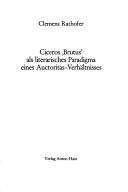| Listing 1 - 3 of 3 |
Sort by
|
Book
ISBN: 9780190857844 9780190857851 0190857854 0190857846 0190857870 0190857862 Year: 2020 Publisher: Oxford: Oxford university press,
Abstract | Keywords | Export | Availability | Bookmark
 Loading...
Loading...Choose an application
- Reference Manager
- EndNote
- RefWorks (Direct export to RefWorks)
"These translations of the Brutus and Orator were conceived as a sequel to the excellent translation of the De oratore by James May and Jaap Wisse, also published by Oxford University Press (Cicero: On the Ideal Orator, Oxford 2001). The book's raison d'être is easily stated. No new, complete, and readily available English versions of the two texts have appeared since the Loeb Classical Library edition was published in 1939, with translations by G. L. Hendrickson and H. M. Hubbell. Though both translations are accurate and still readable (Hendrickson's, in fact, is excellent), the introductions to the two works are brief and insufficient, and the annotation (in the manner of older Loebs) is still less adequate. Furthermore, our understanding of Cicero and the late Roman Republic has changed significantly in the eighty years since the Loeb appeared, and the resources available to students of the Brutus, in particular, are much more ample. I have reason to hope, therefore, that this book will be of some use. There is no need to discuss here the overall plan of the book, which the table of contents makes clear, or the approach taken to the translation and annotation, addressed in Introduction par. 5. The annotation very likely provides more detail than some readers will require, but I thought it best to err on the side of inclusion and leave it to readers to ignore-as readers can be relied on to do-material that does not speak to their needs or interests. I should add two notes. First, because Brutus and Orator are the most important sources for our understanding of Roman "Atticism" (Introduction par. 3), I have included in Appendix A a translation of the third Ciceronian text that bears on that subject, On the Best Kind of Orator (De optimo genere oratorum), a brief fragment that Cicero wrote but abandoned in the interval between the composition of Brutus and Orator in 46 BCE. Second, for the fragmentary remains of orators other than Cicero I have retained references to the fourth edition of Enrica Malcovati's Oratorum Romanorum Fragments (e.g., "ORF4 no. 8 fr. 149"), despite the fact that its successor, Fragments of the Roman Republican Orators (FRRO)-the work of a team led by Catherine Steel-will soon appear. The orators in FRRO will not be numbered and ordered chronologically, as they are in ORF4, but will be organized alphabetically by clan name for ready location, and a set of concordances will facilitate movment back and forth between the two editions"--
Cicero, Marcus Tullius. --- Oratory --- Rhetoric, Ancient --- Ancient rhetoric --- Classical languages --- Greek language --- Greek rhetoric --- Latin language --- Latin rhetoric --- Rhetoric --- Cicero, Marcus Tullius. - Brutus --- Cicero, Marcus Tullius. - Orator

ISBN: 3445024839 9783445024831 Year: 1986 Volume: 174 Publisher: Frankfurt am Main Hain
Abstract | Keywords | Export | Availability | Bookmark
 Loading...
Loading...Choose an application
- Reference Manager
- EndNote
- RefWorks (Direct export to RefWorks)
Cicero, Marcus Tullius. --- Oratory, Ancient --- Cicero, Marcus Tullius --- T︠S︡it︠s︡eron, Mark Tulliĭ --- Cyceron --- Cicéron --- Kikerōn --- Cicerón, M. Tulio --- Ḳiḳero --- Cicerone --- Cicerón, Marco Tulio --- Ḳiḳero, Marḳus Ṭulyus --- Tullius Cicero, Marcus --- Kikerōn, M. T. --- Cicerone, M. T. --- Cicerone, M. Tullio --- Cicero --- Cicero, M. T. --- Cyceron, Marek Tulliusz --- ציצרון, מארקוס טולליוס --- קיקרו, מארקוס טוליוס --- קיקרו, מרקוס טוליוס --- キケロ --- 西塞罗 --- Cicéron, Marcus --- Cicéron. Brutus. --- Cicero (Marcus Tullius). Brutus. --- Cicero, Marcus Tullius - Brutus
Book
ISBN: 9789004274488 9004274480 1322128057 9004278737 9789004278738 Year: 2014 Volume: 371 Publisher: Leiden, Netherlands : Brill,
Abstract | Keywords | Export | Availability | Bookmark
 Loading...
Loading...Choose an application
- Reference Manager
- EndNote
- RefWorks (Direct export to RefWorks)
Rédigé par Cicéron en 46 av. J.-C., le Brutus se présente comme une histoire de l’éloquence romaine depuis ses origines et ses sources grecques jusqu’à l’époque de sa rédaction, mais entend surtout répondre aux défis institutionnels et intellectuels qu’a fait naître la dictature de César. Le traité autorise ainsi des lectures très diverses, qui sont souvent restées isolées les unes des autres. À travers une approche pluridisciplinaire rassemblant des contributeurs de spécialités diverses, cet ouvrage cherche à rendre compte de la réflexion cicéronienne dans toute sa richesse en examinant les enjeux historiographiques, prosopographiques, rhétoriques, philosophiques et politiques du traité. Il propose une réflexion synthétique et originale sur ce texte majeur, essentiel à la compréhension de la République tardive. Cicero’s dialogue Brutus offers a history of Roman eloquence from its origins and Greek roots up to the time of the work's composition (46 BC) in the late Republic. It forms part of Cicero’s response to the political and intellectual changes brought about by Caesar’s dictatorship and has therefore attracted considerable scholarly attention from a number of fields. However, scholarly discourse has frequently remained isolated. This volume addresses the need to look at Cicero’s treatise from an interdisciplinary angle and assembles contributions from scholars of historiography, prosopography, rhetoric, philosophy and politics. It thus puts forward a coherent and genuine interpretation of Cicero’s Brutus that showcases the significance of this text for our understanding of the final years of the Roman Republic.
Oratory, Ancient --- Rhetoric, Ancient --- Politics and literature --- Cicero, Marcus Tullius. --- Oratory, Ancient. --- Rhetoric, Ancient. --- Eloquence antique --- Rhétorique ancienne --- Politique et littérature --- Ancient rhetoric --- Classical languages --- Greek language --- Greek rhetoric --- Latin language --- Latin rhetoric --- Rhetoric --- Politics and literature - Rome --- Cicero, Marcus Tullius. - Brutus
| Listing 1 - 3 of 3 |
Sort by
|

 Search
Search Feedback
Feedback About UniCat
About UniCat  Help
Help News
News